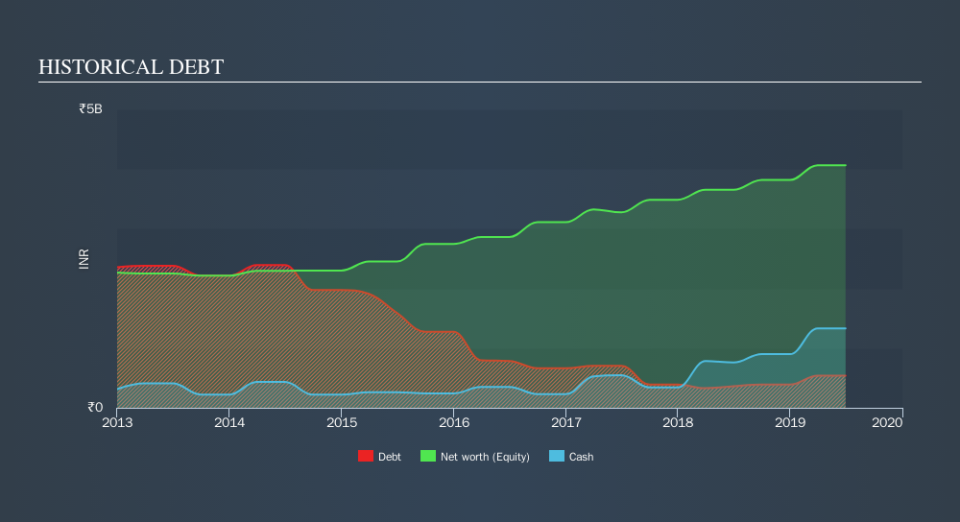Is Deccan Cements (NSE:DECCANCE) A Risky Investment?

The external fund manager backed by Berkshire Hathaway's Charlie Munger, Li Lu, makes no bones about it when he says 'The biggest investment risk is not the volatility of prices, but whether you will suffer a permanent loss of capital. It's only natural to consider a company's balance sheet when you examine how risky it is, since debt is often involved when a business collapses. We can see that Deccan Cements Limited (NSE:DECCANCE) does use debt in its business. But the more important question is: how much risk is that debt creating?
Why Does Debt Bring Risk?
Debt and other liabilities become risky for a business when it cannot easily fulfill those obligations, either with free cash flow or by raising capital at an attractive price. If things get really bad, the lenders can take control of the business. However, a more common (but still painful) scenario is that it has to raise new equity capital at a low price, thus permanently diluting shareholders. Having said that, the most common situation is where a company manages its debt reasonably well - and to its own advantage. When we examine debt levels, we first consider both cash and debt levels, together.
Check out our latest analysis for Deccan Cements
What Is Deccan Cements's Debt?
The image below, which you can click on for greater detail, shows that at March 2019 Deccan Cements had debt of ₹539.5m, up from ₹362.7m in one year. But it also has ₹1.33b in cash to offset that, meaning it has ₹791.0m net cash.
How Healthy Is Deccan Cements's Balance Sheet?
According to the last reported balance sheet, Deccan Cements had liabilities of ₹896.2m due within 12 months, and liabilities of ₹1.25b due beyond 12 months. Offsetting this, it had ₹1.33b in cash and ₹165.8m in receivables that were due within 12 months. So it has liabilities totalling ₹652.2m more than its cash and near-term receivables, combined.
Of course, Deccan Cements has a market capitalization of ₹4.95b, so these liabilities are probably manageable. However, we do think it is worth keeping an eye on its balance sheet strength, as it may change over time. While it does have liabilities worth noting, Deccan Cements also has more cash than debt, so we're pretty confident it can manage its debt safely.
In addition to that, we're happy to report that Deccan Cements has boosted its EBIT by 48%, thus reducing the spectre of future debt repayments. The balance sheet is clearly the area to focus on when you are analysing debt. But it is future earnings, more than anything, that will determine Deccan Cements's ability to maintain a healthy balance sheet going forward. So if you want to see what the professionals think, you might find this free report on analyst profit forecasts to be interesting.
Finally, a company can only pay off debt with cold hard cash, not accounting profits. While Deccan Cements has net cash on its balance sheet, it's still worth taking a look at its ability to convert earnings before interest and tax (EBIT) to free cash flow, to help us understand how quickly it is building (or eroding) that cash balance. Over the most recent three years, Deccan Cements recorded free cash flow worth 56% of its EBIT, which is around normal, given free cash flow excludes interest and tax. This free cash flow puts the company in a good position to pay down debt, when appropriate.
Summing up
Although Deccan Cements's balance sheet isn't particularly strong, due to the total liabilities, it is clearly positive to see that it has net cash of ₹791.0m. And it impressed us with its EBIT growth of 48% over the last year. So is Deccan Cements's debt a risk? It doesn't seem so to us. Over time, share prices tend to follow earnings per share, so if you're interested in Deccan Cements, you may well want to click here to check an interactive graph of its earnings per share history.
At the end of the day, it's often better to focus on companies that are free from net debt. You can access our special list of such companies (all with a track record of profit growth). It's free.
We aim to bring you long-term focused research analysis driven by fundamental data. Note that our analysis may not factor in the latest price-sensitive company announcements or qualitative material.
If you spot an error that warrants correction, please contact the editor at editorial-team@simplywallst.com. This article by Simply Wall St is general in nature. It does not constitute a recommendation to buy or sell any stock, and does not take account of your objectives, or your financial situation. Simply Wall St has no position in the stocks mentioned. Thank you for reading.

